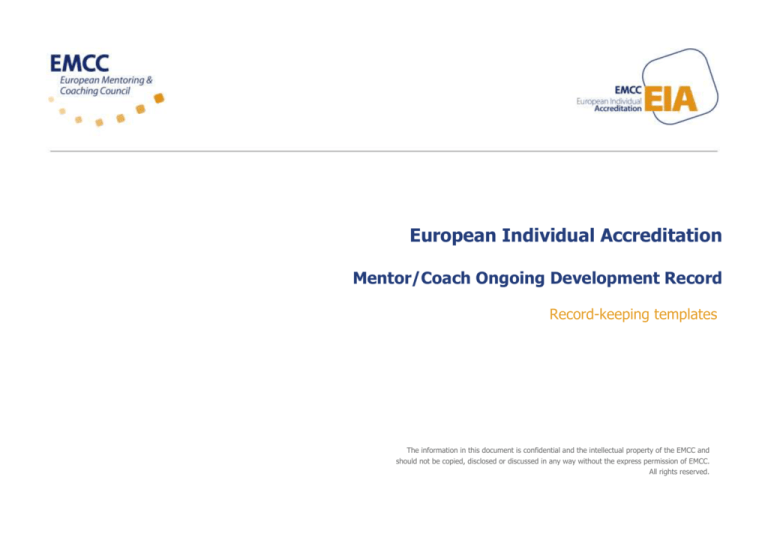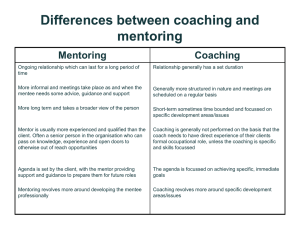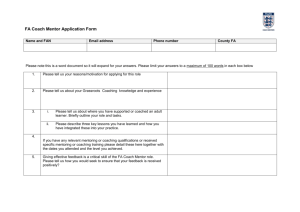
European Individual Accreditation
Mentor/Coach Ongoing Development Record
Record-keeping templates
The information in this document is confidential and the intellectual property of the EMCC and
should not be copied, disclosed or discussed in any way without the express permission of EMCC.
All rights reserved.
Contents
Page
Introduction
About EMCC
Terminology
Guiding principles – reflective practice
Reflective practice and EIA
3
Section 1. Client Work
Client contact hours and number of clients
6
Section 2. Professional Development
Continuous professional development
Mentor/coach supervision
Reflective log - learning and application from reflection
9
Further Information
© EMCC October 2012
12
Mentor/Coach Ongoing Development Record
Page 2 of 11
Introduction
Welcome to the EMCC Mentor/Coach Ongoing Development Record.
The EMCC exists to “develop, promote and set the expectation of best practice in mentoring and coaching across Europe and beyond.” We recognise that for all of us,
as practicing mentors and coaches, ongoing development is critical to ensure high standards, both in our practice and across our profession. We strongly believe that
reflective practice is a crucial activity for all mentors and coaches. In fact, it is a key element in our European Individual Accreditation (EIA).
This pack has been designed to support our members with their ongoing professional development. It will help you to:
keep a log of your practice work
keep a log of your development work
to reflect on key elements of your work and document how you have applied that learning in your practice.
The following record templates have been designed so that you can cut and paste straight into an EIA application, should you wish to.
About EMCC
The EMCC exists to promote good practice and the expectation of good practice in mentoring and coaching across Europe. We are a Europe-wide council that consists
of representatives from national EMCCs plus direct members in countries where a local EMCC does not yet exist. The EMCC membership is a rich mixture of individual
mentors/coaches, mentoring/coaching organisations, training and education providers, buyers of mentoring/coaching and mentor/coach associations – all of whom
share EMCC’s vision to promote good practice in mentoring/coaching.
As part of our drive for raising and promoting quality standards in mentoring/coaching, we are now providing an individual accreditation process based on our The
EMCC Competency Framework. The EIA process has been based on research and consultation with our members and the wider mentoring/coaching community.
Terminology
The following extract from the EMCC Code of Ethics may help explain the terminology used in this document:
The term “mentoring/coaching” is used to describe all types of mentoring or coaching that may be taking place, both in the work environment and outside. The EMCC
recognises that there will be many types of mentoring/coaching taking place...
The term “client” denotes anyone using the services of a mentor/coach ... It is recognised that there are circumstances where the mentor/coach may have two
“clients”, the individual being mentored/coached and the organisation who may have commissioned the mentoring/coaching ... we have used the term “sponsor” to
differentiate the latter.
© EMCC October 2012
Mentor/Coach Ongoing Development Record
Page 3 of 11
The terms “supervision” and “supervisor” describe the process by which the work of the mentor/coach is overseen and advice/guidance sought. The terminology is
the same, but the process may differ in significant ways from that undertaken in other professions, such as psychotherapy and counselling.
Guiding principles – reflective practice
The EMCC exists to promote good practice and the expectation of good practice in mentoring and coaching across Europe. One key feature of the EIA process is the
requirement for evidence of not only a level of professional competence but also current and consistent application to practice underpinned by professional
development through reflection on practice, client feedback, continuous professional development activities and professional supervision. This approach is consistent
with generally accepted good professional development practice (such as Kolb and Schon) and, as such, is congruent with key features of mentoring/coaching.
The templates in this Ongoing Development Record can be adapted to suit your individual preferences and circumstances, and are also ideal for collecting the
kind of evidence of reflective practice that you need to submit an EIA application.
Whether or not you use these for an EIA application, we hope that you find them useful in developing your own practice. Any feedback and suggestions you have to
develop these resources would be very welcome (see contact information at the end of the document).
Reflective practice and EIA
The EIA is a Europe-wide recognised award that demonstrates that an individual is practicing as a professional mentor/coach and they have both the appropriate level
of knowledge and the ability to apply it effectively in their mentoring/coaching practice.
The EIA sets very high standards and is recognised as a quality mentor/coach accreditation in the marketplace. It raises standards and professionalism in
mentoring/coaching by:
setting high standards in assessment criteria
measuring ability against an evidence-based competence framework
using reliable and rigorous assessment processes
demanding a professional, reflective approach
ensuring a commitment to continuing development.
The EIA is relevant for anyone involved in mentoring/coaching, whether it is just one part of their role or their main function. Applications can be made at a level
appropriate to practice - from Foundation to Master Practitioner level. The advantage of this staged, accreditation process is that new mentors/coaches can join early
on in their careers and gain accreditation at higher levels as their abilities and experience grow. Having an EIA award distinguishes professional mentors/coaches with
sound underpinning knowledge and the ability to demonstrate ability against demanding and rigorous standards. Specifically it:
provides users/buyers of mentoring/coaching services greater certainty of competence and ability
raises personal credibility and professional standing of the accredited mentor/coach
demonstrates that the mentor/coach is continually developing and improving their mentoring/coaching abilities
raises the credibility and standards of the profession
is more than a qualification – it recognises that a qualified mentor/coach is also applying and developing these competencies in practice
provides a framework for continuing personal and professional development.
It is recognised that achieving the EIA accreditation requires commitment and hard work from applicants, demanding a professional approach. Applicants say that the
process of working towards their accreditation is both affirming and developmentally useful.
© EMCC October 2012
Mentor/Coach Ongoing Development Record
Page 4 of 11
One-to-one personal support from an advisor who is a trained EIA assessor is also available (see contact details below).
Section 1. Client Work
The following templates are designed to help you to keep records about your mentoring/coaching practice sessions with clients. They are formatted in a compatible
style to those in the EIA Application to make the transfer of this information as simple as possible when you make an application.
Client contact hours and number of clients
For EIA, you will need to demonstrate at least the minimum number of hours required for the level you are applying for, using the layout in the application form. The
log captures information on dates of mentoring/coaching, client initials, organisation type or name, client role, hours mentored/coached and areas worked on. When
completing these, and then preparing this information for an application, please consider the following notes:
Sort by client, then date.
Client name, initials or an identifying code should be used to identify the client (the EIA process requires that clients could be contacted directly if necessary and
sampled as a quality assurance check).
Where you have worked with a client for several hours you may decide to summarise this work on a separate form, documenting this as one entry, showing the
“from” and “to” dates in the date column rather than submitting entries of every session separately.
The number of required hours for an EIA application should be one-to-one mentoring/coaching activity rather than group facilitation/training or role-played
mentoring/coaching sessions on a training event (one-to-one sessions which follow a training event are admissible).
You may wish to keep a separate record of other mentoring/coaching activities you are involved in, in additional to your hours (for example, group
mentoring/coaching, mentoring/coaching within part of a training programme) and please show this separately from the client contact form.
© EMCC October 2012
Mentor/Coach Ongoing Development Record
Page 5 of 11
Client profiles information sheet (one sheet per client):
START DATE / CONTRACTING /
FINISH DATE (IF APPROPRIATE)
CLIENT IDENTIFIER
/ INITIALS
CLIENT ORGANISATION TYPE / NAME
CLIENT ROLE
CONTRACTED FOCUS OF WORK
OTHER NOTES /
linked document
references
START DATE / CONTRACTING /
FINISH DATE (IF APPROPRIATE)
CLIENT IDENTIFIER
/ INITIALS
CLIENT ORGANISATION TYPE / NAME
CLIENT ROLE
CONTRACTED FOCUS OF WORK
OTHER NOTES /
linked document
references
START DATE / CONTRACTING /
FINISH DATE (IF APPROPRIATE)
CLIENT IDENTIFIER
/ INITIALS
CLIENT ORGANISATION TYPE / NAME
CLIENT ROLE
CONTRACTED FOCUS OF WORK
OTHER NOTES /
linked document
references
Use further sheets as necessary.
© EMCC October 2012
Mentor/Coach Ongoing Development Record
Page 6 of 11
Total client hours summary sheet for the period (dates):
DATE
CLIENT
CLIENT ORGANISATION TYPE / NAME
CLIENT ROLE
HOURS
AREAS WORKED ON
linked document reference if relevant
Insert more rows as required; use further sheets as necessary.
Subtotal / Total Hours
© EMCC October 2012
Mentor/Coach Ongoing Development Record
Page 7 of 11
Section 2. Professional Development
Continuous professional development
For EIA you need to provide evidence for the preceding 12 months, of at least the minimum number of CPD hours required for the level for which you are applying.
Ideally, this will include reference to a range of learning methods such as conferences, seminars, workshops, reading and presentations. Tangible evidence of
attendance and participation such as certificates of attendance is useful to keep.
Continuing professional development log:
DATE
HOURS
EVENT/ACTIVITY
COMPETENCE AREAS COVERED
Insert more rows as required; use further sheets as necessary.
Subtotal / Total Hours
© EMCC October 2012
Mentor/Coach Ongoing Development Record
Page 8 of 11
Mentor/coach supervision
For the EIA, you need to provide evidence of at least the minimum number of mentor/coach supervision hours for the preceding 12 months required for the level
for which you are applying (see the Guide to Applying for details).
Your Supervisors should be suitably qualified and/or experienced (a description of your supervisors’ qualifications and/or experience is required for EIA).
It is useful to keep separate records for each supervisor if you have more than one because, for EIA, each supervisor should sign a relevant log (so) as a true
reflection of your sessions.
Mentor/coach supervision log (use separate sheets for each supervisor if more than one):
DATE
HOURS
TYPE
COMPETENCE AREAS COVERED
Insert more rows as required; use further sheets as necessary.
Sub/Total Supervision Hours
© EMCC October 2012
Mentor/Coach Ongoing Development Record
Page 9 of 11
Reflective Log - learning and application from reflection
For EIA, you will need to provide evidence of at least five reflections/learning over the preceding 12 months – so keeping regular Learning Log notes in this format
would give you examples from which to choose (and it is good practice in preparation for supervision). These reflections should be drawn from a range of the
following:
DATE
Client Work - learning and application from reflecting on your client work
Demonstrate how you reflect on your work with clients: what have been some of the key issues that have arisen; what have you reflected upon and what
sense have you made of that and how is that now applied to your practice?
Client feedback
Show how you have reflected on and applied the client feedback you have received.
Mentor/Coach Supervision – learning and application from structured supervision sessions
Include learning that has come from your reflections in supervision and how you have applied this to your practice.
Continuous Professional Development – learning and application from planned development activity
Demonstrate learning from planned development activity and how you have then applied them to your practice.
CLIENT NAME / EVENT /
LEARNING EXPERIENCE
REFLECTION ON LEARNING AND APPLICATION TO PRACTICE
COMPETENCE AREA
Insert more rows as required; use further sheets as necessary.
© EMCC October 2012
Mentor/Coach Ongoing Development Record
Page 10 of 11
Further Information
For more information on applying for EIA, please visit the EMCC website where you can download the appropriate Guide to Applying, Application Form, and other
resourceful documents: www.emccouncil.org/eu/en/accreditation/eia.
If you seek further information about making an EIA application, please contact the EMCC or your local accreditation manager, posted at the above website.
If you would like to make any suggestions about the development of these resources, please contact: EMCC.EIA.WorkGroup.Leader@emccouncil.org.
© EMCC October 2012
Mentor/Coach Ongoing Development Record
Page 11 of 11







